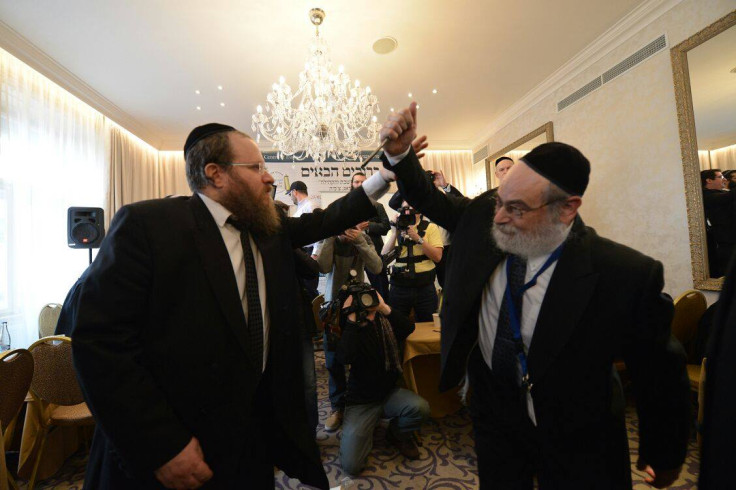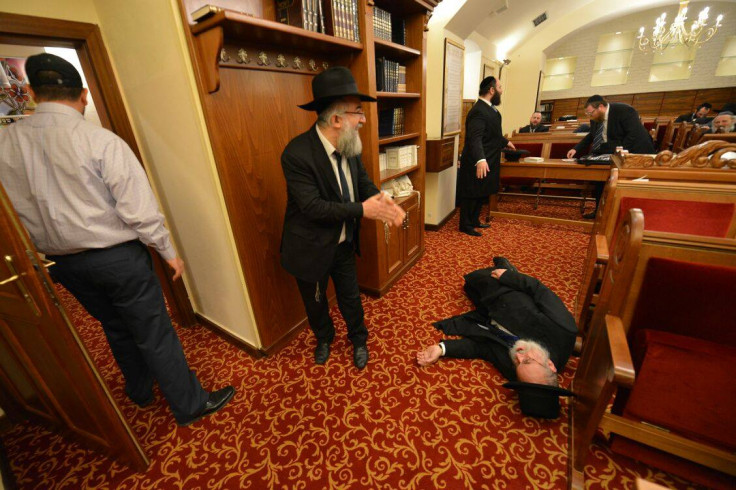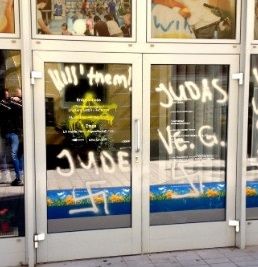Meet the 'Jewish fight club' rabbi who wants to stop anti-Semitism with guns

This month marks the 70<sup>th anniversary of the liberation of some of the most notorious concentration camps in Nazi Germany. Dachau, Buchenwald, Bergen-Belsen: names that will live forever in infamy, and continue to shape the attitudes of the Jewish people today.
Across the modern Jewish diaspora, there is a determination to ensure the horrors of those camps are never inflicted upon their people again. Jewish right-wing leaders preach the language of constant vigilance, none more so than Bibi Netanyahu, the Israeli leader who has made 'never again' the defining mantra of his political career.
Now a Belgian rabbi every bit as bellicose as Bibi is beginning to make his presence felt. Menachem Margolin, the head of the European Jewish Association, doesn't have Netanyahu's poise; in recent weeks he has had to deal with a barrage of scorn and mockery. Yet, no matter how much flak is thrown at him, it seems nothing will shake him from his core mission: to get the Jewish population to stand up and fight.
In the wake of the Charlie Hebdo massacre, which saw four people killed in an attack on a Kosher bakery, Margolin was inundated with abuse after suggesting Jews in Europe should be allowed to carry guns. Many saw this as the sort of knuckle-headed drivel normally associated with American NRA leaders, but Margolin was undaunted. He claimed he had been misquoted, but the crux of his message was perfectly justified.
Then, in February, he organised a self-defence class for rabbis from across Europe in Prague. Pictures from the event make it look like a Pythonesque skit; a bunch of Orthodox Jews grappling and wielding knives while dressed in kippahs and rabbinical suits. Pictures of the 'Jewish fight club' prompted reams of derision on social media, but again Margolin ignored the abuse. In fact, he's planning to run more self-defence classes in future.
When you speak to Margolin, it is clear that he is inured to the insults, shielded by a siege mentality borne of the rising tide of anti-Semitism in recent months. According to him, the Kosher bakery attack is just the tip of the iceberg.
"The situation today is that many Jewish people in Europe feel fear when they walk the streets with Jewish symbols, such as kippah and beards" Margolin tells IBTimes UK. "It's happened so many times in recent times that Jewish people have been beaten in the streets.
"After the Holocaust people were much more sensitive, but as years passed by people have forgotten what happened, they have forgotten the consequences, and they continue with anti-semitic reactions."
I ask Margolin to give me some specific examples of anti-semitic attacks, bar the high-profile terrorist incidents in Paris and at the Jewish Museum of Belgium last year. But he says: "the situation today is that something happens almost every day [so] there is no way for the media to report it. Jews are being threatened every day, they get into fight. It's not every day that Jewish people are stabbed, but it's very difficult to keep a record.
"The reports show that we had over 5,000 attacks across Europe in the past year. You have many kinds of attacks; there is one thing when a person goes on the streets, there are those who get into a physical fight, and then you have massive terror attacks like you had in Paris. All of those things bring us to a situation where Jewish people do not feel secure. It's more important to think what can be done than to define the nature of each attack."
'The situation today is that something happens almost every day [so] there is no way for the media to report it.'
Margolin also claims that the percentage of Europeans harbouring anti-semitic views ranges from 25 to 45%, depending on the country. Although the research has been commissioned by the Anti-Defamation League, a US-based Jewish NGO, these startling figures appeared to be supported by non-Jewish sources.
Indeed, a report commissioned by the Mayor of London last year revealed that 95% of hate crimes against the capital's faith groups were anti-semitic in nature, while a 2013 report by the EU Agency for Fundamental Rights found that over 25% of Europe's Jews had experienced an anti-semitic attack over the previous 12 months.
'You can't blame Muslims'
Margolin says it's impossible to pin the anti-Semitism on a particular demographic group, and stresses that the blame should not be pinned on Europe's Islamic population.
"I don't think you should say Muslim people [are behind it]" he says, "because it has become easy to blame Muslim communities. The majority of Muslims are against anti-Semitism.
"It's been an easy excuse for European leaders to blame Muslims. A poll by the ADL shows that the most anti-semitic countries are the ones which have little or no Muslim population. People in a bad economic situation always look for people who should be responsible for their problems. It stems from a lack of knowledge."

Margolin believes last year's war in Gaza may have provided "an excuse for people to fight against Jews", but says, perfectly reasonably, "there are so many conflicts in the world but if you see a Russian in London, you won't blame him for what happened in Ukraine.
"If you see a Chinese person, you won't blame him for the problems in Tibet. If you see a Turkish person you won't blame him for the problems with Kurdistan. If you see an American, you won't blame him for the thousands of conflicts that America is involved in.
"To blame an English, a British Jew who is not Israeli, has never visited Israel, for a policy in Israel is an excuse to blame Jews, and people think maybe they now have an excuse to express their opinion."
'We want every Jew to be able to defend himself'
In the face of this perceived tidal wave of hatred, Margolin believes the Jewish community must become stronger. No-one else is sticking up for them, so they need to do it for themselves. In fact, he says, "the aim is for every Jew to defend himself."
'If you see a Russian in London, you won't blame him for what happened in Ukraine. To blame an English Jew for what happened in Gaza is an excuse'
This was the central objective of the rabbi self-defence class in Prague which, according to Margolin, was attended by 100 rabbis, ranging from 27 to 70 years old. He adds that, although the rabbis "were not very happy that we needed to do it," they ultimately recognised that the course was "very important."
What exactly did they learn in Prague? "The first set of instructions we had was basic stuff, like how to protect yourself if you're attacked with a knife and tries to stab you," says Margolin. "We couldn't dedicate too much time on [self-defence techniques] because there was other issues to discuss, so we wanted to teach them something that could save their lives.
"But the next self-defence courses will include self-defence not only from knife attacks but other kinds of attack. We are working now on different dates."
'All Jewish institutions are targets for anti-semitic terror'
Finally we turn to the gun controversy, the most controversial episode so far in Margolin's career as a Jewish figurehead.

When I raise it, he immediately goes on the defensive, saying that he had been misquoted. Rather than suggesting that all Jews should be able to carry guns, "I said it was the responsibility of governments to protect Jewish institutions, and it should be clear that any Jewish institutions, every Jewish school, every Jewish kindergarten, restaurant, Kosher supermarket, should be protected and policed 24/7. It is clear that all Jewish institutions are targets for anti-semitic terror groups.
"It is very clear, no-one has any doubts, that Jewish institutions are a target, it's been proved thousands of times, and it's the responsibility of the government to protect it 24/7. However if there is a decision not to protect these institutions for any reason, be it lack of finance, lack of manpower, the authorities should allow a few individuals to be appointed by the community to take responsibility for the security, people who will be trained and pass all the procedure in order to be an official guard.
"Those people should be able to carry a gun, so if you go to a Synagogue or send your children to a Jewish school, you know there might not be policemen who can protect the child, but there are people who can pass the procedure and can protect the kids in case of an emergency."
Who would be eligible to serve as guards? "People who served in the army, people who worked for the police, people who worked for security, who would pass through the normal procedure like any guard anywhere in the world goes through. It's not a new system we need to initiate, in any country in the world you have guards who carry weapons. It's not something new."
I want to know more about the procedure. How would the 'guards' be monitored? Who would be in charge of the selection process? How would they be independently vetted, outside the Jewish community? And what would constitute reasonable grounds for the guards to shoot?
But Margolin cuts off my descent into the finer details. "What bothers me," he says, "is there are so many questions about this, the legislation etc. Why is it acceptable that there could be a situation where a person who takes their son to school won't be able to pick them up in the afternoon? This is a much more disturbing question than a question of how we can trust a security guard to have a gun in his house."
It's hard to escape the conclusion that Margolin's solution is a touch extreme, and would set a dangerous precedent. Would the LGBT communities of Russia and Eastern Europe, for example, then request their own weapons to deal with local homophobes? What about the Roma families so often abused in France? And, most pertinently, what about the Muslims facing Islamophobic attacks across the continent?
Yet, no matter how many holes you pick in his ideas and arguments, it's hard not to admire Rabbi Margolin. He may be slightly unorthodox (no pun intended), but no-one is doing more to ensure that, wherever anti-Semitism rears its head, the Jews are ready for it.
© Copyright IBTimes 2025. All rights reserved.






















